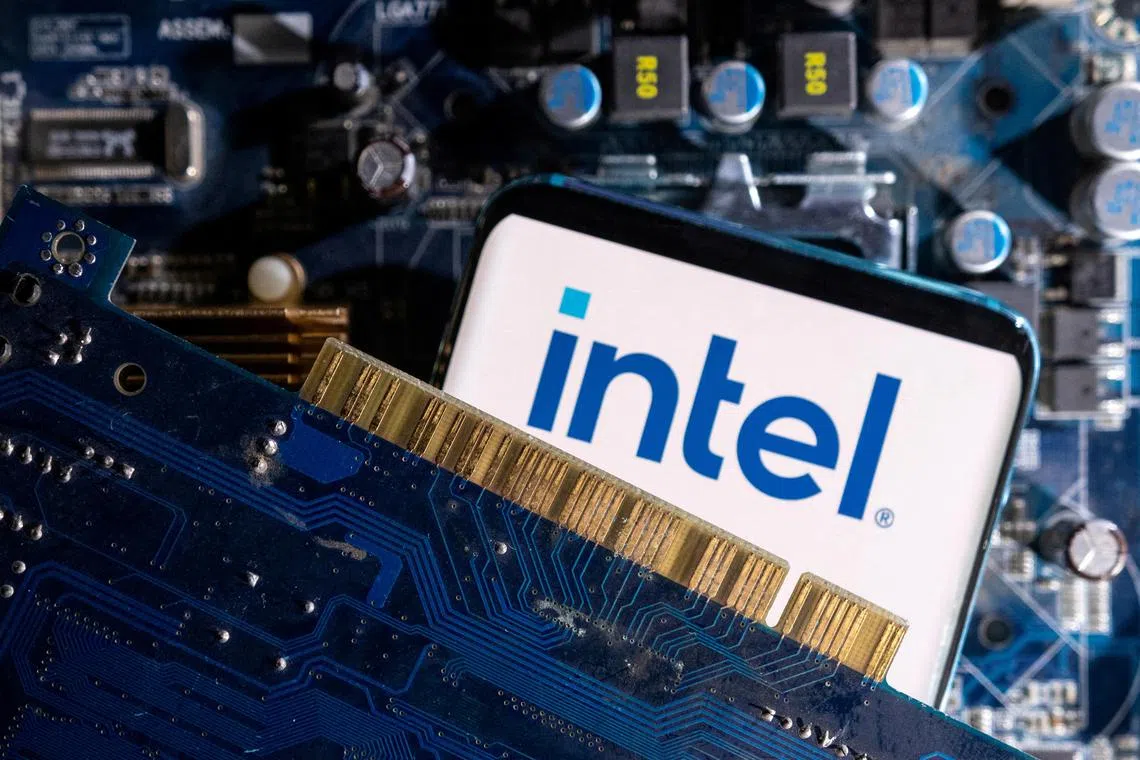Intel to cut over 15,000 jobs as chip giant falls behind in AI race
Sign up now: Get ST's newsletters delivered to your inbox

The chipmaker has lost business to rivals better equipped for the AI boom.
PHOTO: REUTERS
San Francisco - Intel shares plunged more than 19 per cent on Aug 1 after delivering a barrage of startling news, including a grim growth forecast and plans to slash more than 15,000 jobs, in the latest sign that the chipmaker is ill-equipped to compete in the artificial intelligence era.
Sales for the current quarter will be US$12.5 billion (S$16.7 billion) to US$13.5 billion, the company said on Aug 1. Analysts had projected US$14.38 billion on average, according to data compiled by Bloomberg. Intel will have a loss of 3 US cents a share, excluding certain items, versus expectations for a profit of 30 US cents.
Intel said it plans to cut more than 15 per cent of its workforce of around 110,000 people. It is also suspending dividend payments to shareholders starting in the fourth quarter, and will continue that until “cash flows improve to sustainably higher levels”, according to the statement. The company has paid a dividend since 1992.
“I have no illusions that the path in front of us will be easy,” chief executive Pat Gelsinger said in a memo to employees. “You shouldn’t either.” He called the moves “some of the most consequential changes in our company’s history”.
Mr Gelsinger, despite a massive spending plan to restore Intel to industry prominence, is struggling to improve its products and technology fast enough to retain customers.
The results underscore a dramatic decline for Intel, which dominated the semiconductor industry for decades and is now forced to tout cost-cutting measures and give reassurances that it can fund growth plans.
In the second quarter, the company had a profit of 2 US cents a share, excluding certain items, and revenue of US$12.8 billion, down 1 per cent. Analysts had estimated a profit of 10 cents a share and sales of US$12.95 billion.
Wall Street is projecting a modest increase in overall sales this year from 2024, still leaving the company more than US$20 billion below its peak in 2021.
Competitors who specialise in AI are winning over some of Intel’s customers. Nvidia now has more than twice its former nemesis’ quarterly sales. Once a struggling rival, Advanced Micro Devices is valued more than US$100 billion higher by investors and Taiwan Semiconductor Manufacturing Company is widely recognised as having the industry’s best production.
Mr Gelsinger remains confident that Intel is on the right track in the long run. He has argued that Intel’s vital manufacturing is on course to catch and pass those of rivals and that it will attract outside customers and justify the string of new plants Intel is building. He thinks Intel has paid what it needs to catch up to the industry, and now can focus on its finances.
Some of Intel’s best chips are manufactured by others. Over time, it hopes to shift more of its chip manufacturing to its own plants, which are being upgraded.
Intel is also working to accelerate improvements in chips for AI PCs. But for now, the expenses are squeezing gross margins, said chief financial officer David Zinsner.
Gross margin, or the percentage of sales remaining after deducting the cost of production, was 35.4 per cent in the quarter. That measure will stay flat in the current quarter. At its peak, Intel regularly reported gross margins of well above 60 per cent.
The company is reducing its spending on new plants and equipment in 2024 by more than 20 per cent, and is now budgeting between US$25 billion and US$27 billion. In 2025, expenses will range between US$20 billion and US$23 billion.
Most of the job reductions, needed also to remove bureaucracy and speed up decision-making, will be completed by the end of the year, Mr Gelsinger told staff.
Intel was forced to reduce its sales expectations in May after the US government revoked its licence to supply chips to China’s Huawei Technologies, part of Washington’s push to cut off that company for what it alleges are national security risks.
Sales at the crucial data centre unit, once the most profitable, again lost ground, declining 3 per cent to US$3 billion. That unit has not yet achieved anything like the market presence of Nvidia in accelerator chips used in AI systems. AI is proving a gold mine, and cutting into spending on the type of processor Intel makes. BLOOMBERG


